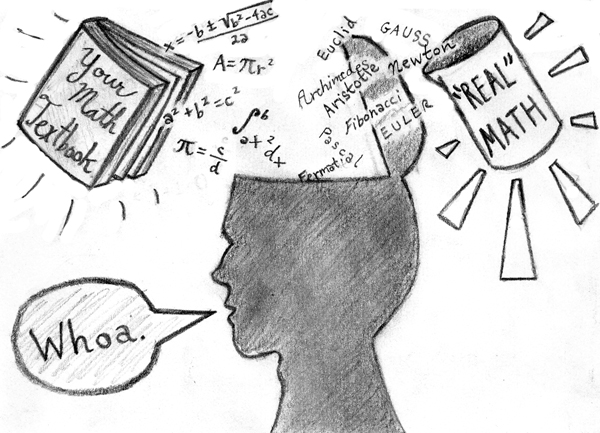Don’t sell yourself short on math
 Do you hate math? Many people claim to. Derision of math is common and even encouraged in our society, to the point that a shared hatred of
Do you hate math? Many people claim to. Derision of math is common and even encouraged in our society, to the point that a shared hatred of 
math can yield social benefits. I know all kinds of people who are passionate about science, language, history, or the arts. But few are passionate about math, and that needs to change.
The breeding ground for intellectual curiosity is education, and sadly, our educational system has failed us in regards to math. I’m going to show you why being cheated out of the math education you deserve has distorted your perceptions of math and turned you away from this fascinating and beautiful subject.
First off is that you haven’t studied any great mathematicians. An American history teacher would be fired outright for going an entire year without studying Washington, Lincoln, or Roosevelt. Likewise for an English teacher without reading Shakespeare, or a physics teacher without mentioning Einstein.
Yet somehow it is acceptable that in our 12 years of mathematics education, we learn nothing of the mathematical greats who defined the subject. To not make mention of Archimedes, Newton, Gauss, and Fermat is nothing less than a travesty, and not because everyone needs to know these names for their own sake.
The reason is that because without the context of how mathematics came to be, the actual math itself is meaningless. Learning how to solve for x in algebra class is a dry and sterile process until one learns about the great Arabic mathematicians of the 11th century who invented algebra, and pushed mathematics to great new heights by deciding to use arbitrary variables like x and y instead of numbers.
Solving differential equations in calculus class is a chore until one learns that Newton, in his early twenties, invented calculus in a matter of months (and practically on a dare at that), and that his doing so kickstarted the following two centuries of unprecedented scientific and technological innovation.
Deprived of this context, math is devoid of the significance that makes it so interesting in the first place. When we teach it in a vacuum, it’s understandable why nobody seems to like learning math.
The second reason is that you don’t know what math actually is. To clarify, what you learned in school is not math. Rote memorizing facts and procedures for recitation on a test is not math any more than practicing scales and rhythms is music.
The simple fact is that we’re part of an educational system which ostensibly values mathematics but in actuality prioritizes superficial, rote-based learning over the much deeper conceptual understanding one needs to truly enjoy the subject.
The way we teach math in schools is disjointed and shallow; it informs us of the methods by which to solve a specific subset of problems, but doesn’t bother to dig into why these methods work or how they fit into the larger mathematical framework.
Imagine if music classes only taught scales and rhythms, but never progressed to the beautiful symphonic and solo pieces that make music what it is. Or imagine a photography class that only taught lighting and compositional techniques, but never actually required you to take a picture. Humanities teachers have always known that the best way to engage students is by jumping right into the heart of what makes the art form worth participating in.
In the case of math, these are the proofs, the patterns, and the problem solving that teach the creativity and rigor that we all need to have as adults. Students who are forced to learn on the fly to solve problems beyond the scope of their abilities learn more than those who don’t, and get far more enjoyment out of doing so. We see far too little of this in the modern classroom.
Every person learns differently, and I don’t claim to have the golden ticket to teaching math, nor to the obvious decline in math skills in this country. I can only speak to my own experience, which is that my love of math arose in spite of school, not because of it.
So try going outside the curriculum for a change. I suggest starting with Khan Academy, an online resource for math students. You might just find love where you least expected it.
